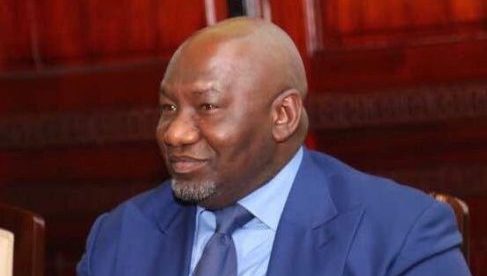On March 22, 2018, Justice O.A. Musa of the Federal High Court, Abuja declared that the Economic and Financial Crimes Commission has no right to declare anybody wanted without obtaining a court warrant. The court then ordered EFCC to remove the “wanted” declaration on Peters from its website.
Peters will heave a sigh of relief after being hunted and maligned for over a year with intense attack on his reputation and public perception. Peters was declared wanted by the EFCC in 2016, ostensibly on allegations that he was involved in an incident of $115 million bribe given to officials of the Independent National Electoral Commission by a former Minister of Petroleum Resources, Diezani Alison-Madueke, during the build-up to the 2015 election.
More than a year after being wrongly labelled “a fugitive”, Peters is back to clear his name. He sought the court to declare EFCC’s actions severally in declaring him a wanted person without a prior valid court order illegal and a flagrant violation of his fundamental rights. He explained to the court the circumstances surrounding his encounter with the EFCC.
On the facts, Peters asserted that he was requested to attend EFCC but at the time of the request, he was not in Nigeria as he was receiving treatment in France, providing specific details of his medical circumstances and the location where he was being treated. He sought the rearrangement of the appointment by communication through his solicitors, leading to the appointment being rescheduled for June 2, 2016.
Before that date, his medical circumstances made his attendance impractical. He sought, in writing, a further deferment of the interview to the end of August 2016, through his lawyer, Wole Olanipekun (SAN). However, prior to the date, EFCC started making a series of aggressive, dangerous moves, including the arrest of some of management staff of the Aiteo Group and Benedict Peters’ aides and workers.
On August 15, 2016, the EFCC declared Peters wanted without an order of Court and in the absence of a valid charge in a court of law. The declaration was published on the official website of the EFCC with his photograph placed. It also circulated the declaration to media houses and some of them, including Sahara Reporters, put it on their front page and kept promoting it as a news story, even after a year. This is against the legal mantra of: “Innocent until proven guilty.”
The EFCC’s defence to its actions is that it acted based on a warrant of arrest issued by a magistrate court. Justice Musa scrutinized the contents of the document and realized that the signed document was received a day before it was actually signed by the person who purported to have signed it. He therefore, declared the warrant null and void. Besides, the judge said: “There is nowhere in the purported warrant … that the Magistrate authorised the 1st Respondent (EFCC) to declare the Applicant (Benedict Peters) wanted. The warrant simply authorised the Complainant (EFCC) to bring the Defendant (Benedict Peters) before the Court to answer the complaint made against him.”
The judge therefore gave the judgement in favour of Peters and declared that the EFCC had no right to declare anybody “wanted” without obtaining a valid court warrant. Furthermore, the judge ordered that EFCC remove the “wanted” declaration on him from its website.
Since last year, Peters has been winning series of court cases as he responds to allegations levelled against him in the public and in the law court. This case is the most recent of them. Last December, a money laundering charge against him was thrown out in court for lack of evidence and the court declared his earnings legitimate.
The anticorruption mantra is one of the cornerstones of the Buhari administration. However, the execution of this policy has not worked out well because of several issues in the legal and law enforcement framework. These issues include arbitrary behaviour by law-enforcement and prosecution agencies like the EFCC.
The EFCC needs to set its house in order and follow due procedure in prosecuting alleged cases of corruption. The case of Benedict Peters is an obvious infringement of human right and in saner climes, the agency would be made to pay for damages to the victim’s reputation. Wrong moves like the one made on Benedict Peters make it possible for the innocent to suffer, and the guilty to be free. This is why everyone deserves the benefit of a doubt.
. Ahmed writes from Lagos.
Benny Peters: Everyone deserves benefit of doubt, by Bilkisu Ahmed
Previous ArticleNIMASA seeks national policy to actualize maritime strategy
Next Article Flying Doctors Founder bags aviation award


